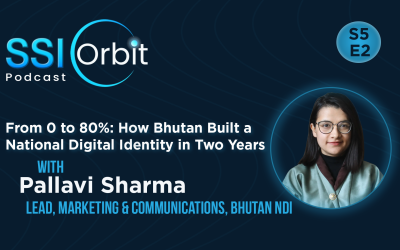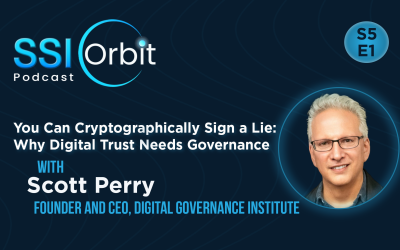>>> Listen to this Episode On Spotify
>>> Listen to this Episode On Apple Podcasts
About Podcast Episode
Digital Trust Infrastructure is quickly becoming essential from an economic, political and security standpoint.
Much of the infrastructure today is controlled and owned by device OS providers such as Apple and Google.
It’s crucial that digital trust infrastructure providers can compete with the device OS providers.
To produce a level playing field, we must have open standards and open access to the infrastructure. This applies to both to Governments and Private Sector digital trust providers.
Some of the key topics covered during this episode with Drummond are:
- Wallets vs Agents – their differences, their relationship and how agents will use more and more contextual intelligence to help you make decisions according to your preferences.
- Can non-OS digital trust infrastructure providers compete with the device OS providers? (e.g., Apple owns the OS for mobile/desktops/tablets/smart watches)
- Comparing DIDComm to NFC – if NFC really facilitates security and trust for close distance, do the combinations of digital wallets, digital agents and protocols (like DIDComm) do the same for trust at distance?
- Trust Spanning Protocol – establishing authentic connections where both parties can authenticate each other (using the same hourglass model as TCP/IP). What are the architectural requirements for this protocol? And how can various protocols (e.g., DIDComm, KERI) converge into a trust spanning protocol?
- What does DIDComm do better/different than other data exchange protocols? (such as OAuth2 and OpenID Connect)
- Can the Trust over IP stack be used outside of Identity use cases? (e.g., payments, data sharing, social media)
- Comparing SSI to Email – similarities in protocol design, asynchronous or synchronous UX, simplicity and generality.
About Guest

Drummond Reed has spent a quarter-century in Internet identity, security, privacy, and trust infrastructure. He is Director, Trust Services at Avast after their acquisition of Evernym, where he was Chief Trust Office.
He is co-author of the book, Self-Sovereign Identity (Manning Publications, 2021), and co-editor of the W3C Decentralized Identifiers (DID) 1.0 specification. At the Trust over IP Foundation, Drummond is a member of the Steering Committee and co-chair of the Governance Stack Working Group and the Concepts and Terminology Working Group. At the Sovrin Foundation, he served as co-chair of the Sovrin Governance Framework Working Group for five years.
From 2005-2015 he was co-chair of the OASIS XDI Technical Committee, a semantic data interchange protocol that implements Privacy by Design. Drummond also served as Executive Director for two industry foundations: the Information Card Foundation and the Open Identity Exchange, and as a founding board member of the OpenID Foundation, ISTPA, XDI.org, and Identity Commons. In 2002 he received the Digital Identity Pioneer Award from Digital ID World, and in 2013 he was cited as an OASIS Distinguished Contributor.
LinkedIn: https://www.linkedin.com/in/drummondreed/
Twitter: https://twitter.com/drummondreed






